Mangrove forests: Photography winners show beauty of ecosystems
Musfiqur Rahman has been named overall winner of this year's Mangrove Photography Awards, for his image of a wild honey gatherer subduing giant honeybees with smoke, in Bangladesh.
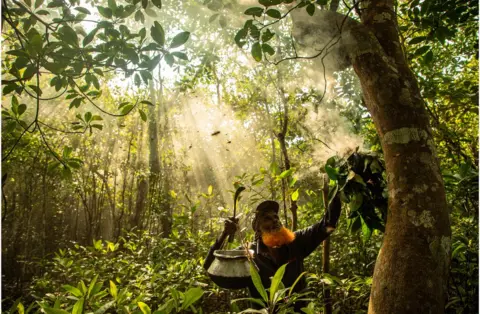 Musfiqur Rahman
Musfiqur RahmanRun by the Mangrove Action Project, the competition - now in its seventh year - aims to show the relationships between wildlife, coastal communities and mangrove forests, as well as the fragility of these unique ecosystems, both above and below the waterline.
Rahman's winning image, A Brave Livelihood, was selected from more than 1,300 entries from 65 countries.
"Indigenous Mowal honey gatherers, protected by Bonbibi, the forest goddess, must evade the dangers (Bengal tigers and saltwater crocodiles) lurking in the mangroves," says Rahman.
"This ancient tradition and sustainable relationship between people and the mangrove forest takes place in the Sundarbans in Bangladesh, and also India."
Mangroves are an important protection against climate change, with one acre (4,000 sq m) of mangrove forest absorbing nearly the same amount of carbon dioxide as an acre of Amazon rainforest.
The forests also protect coastlines from eroding as intense storms grow more frequent.
"Today, less than half the world's original mangrove forest cover remains," says competition judge Robert Irwin.
"It has never been more important to promote the conservation of these fragile ecosystems through inspiring photography."
Here is a selection of winning images from six competition categories, with descriptions by the photographers.

Mangroves & People winner: Mangrove Propagators, by Mark Kevin Badayos, Philippines
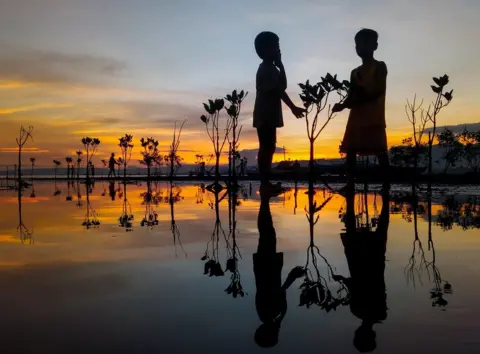 Mark Kevin Badayos
Mark Kevin BadayosThe sun sets on a stretch of coastline after a mangrove restoration and beach clean took place within the local community.

Mangroves & People runner-up: Kayaking at Al Reem Island, by Hooreya Al Muflahi, UAE
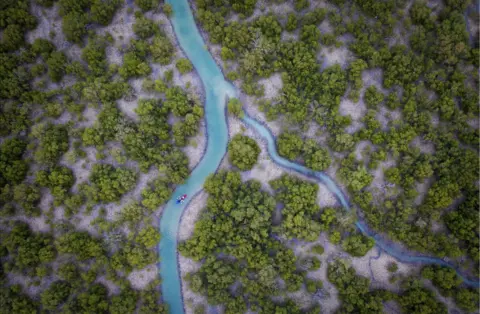 Hooreya Al Muflahi
Hooreya Al MuflahiEnchanted by the mangroves during a kayaking trip, we put the drone up to get a different perspective to reveal the perfectly calm blue water between the mangroves.

Mangroves & People highly commended: Work in Progress, by Abhijit Chakraborty, India
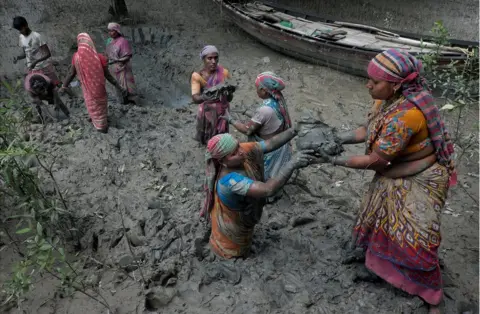 Abhijit Chakraborty
Abhijit ChakrabortyAs climate change and sea level rise threaten the future of the Sundarbans, building dams and mangrove beds is becoming one of the last hopes for the people here.

Mangroves & Landscape winner: Autumn Tree, by Zohaib Anjum, UAE
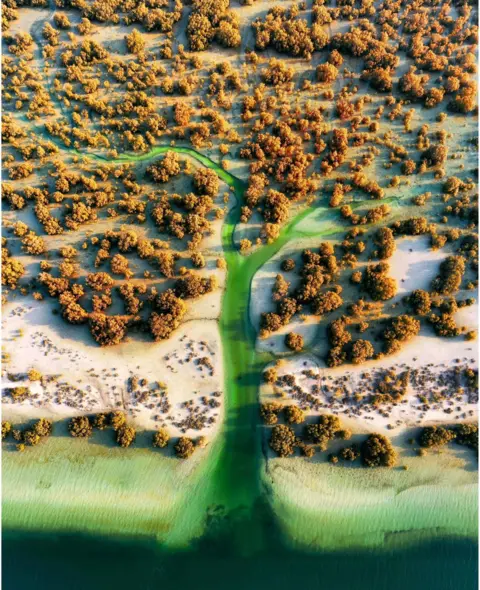 Zohaib Anjum
Zohaib AnjumMost of the mangroves along UAE's coastline are found in Abu Dhabi, acting as a "green lung" for the city.

Mangroves & Landscape runner-up: Mangroves at Dawn, by Melodi Roberts, USA
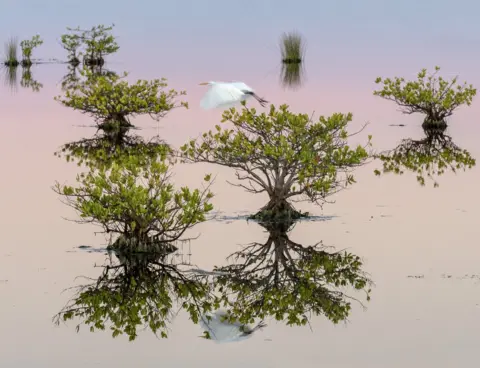 Melodi Roberts
Melodi RobertsA peaceful early morning moment at the Merritt Island National Wildlife Refuge in Florida.

Mangroves & Landscape highly commended: Shining Stars above Mangrove Tree, by Yusuf Bin Madi, Malaysia
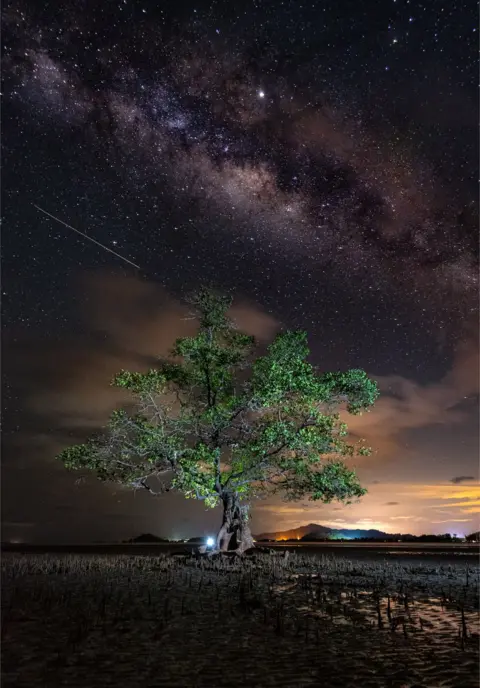 Yusuf Bin Madi
Yusuf Bin MadiThe Milky Way shining above a mangrove tree at Mersing Beach, Pulau Mawar, Malaysia, an area only accessible by foot at low tide.

Mangroves & Wildlife winner: Adaptation of Bengal Tiger, by Arijit Das, India
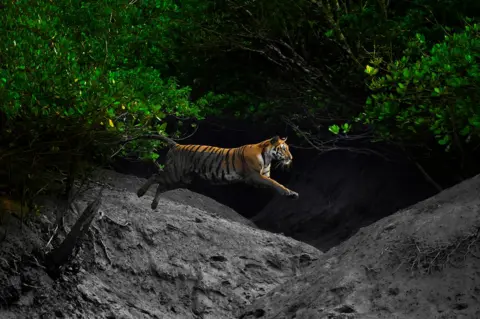 Arijit Das
Arijit DasAfter four days of tracking the elusive Bengal tiger, we were finally able to predict where this individual might cross a creek.

Mangroves & Wildlife runner-up: Dancing Mudskipper, by Leo Liu, Taiwan
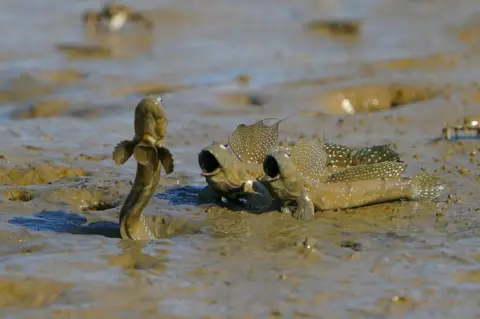 Leo Liu
Leo LiuThe two mudskippers were stunned during a fight for territory, by a playful dancing individual.
These amphibious fish live in mudflats and connected mangrove ecosystems.

Mangroves & Underwater winner: Shelter, by Shane Gross, Bahamas
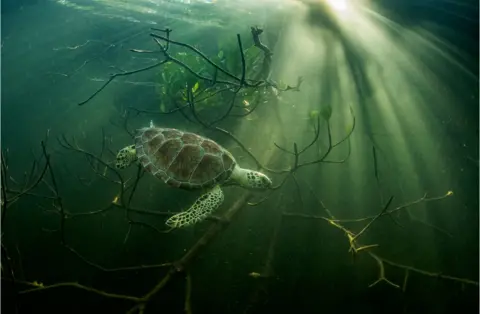 Shane Gross
Shane GrossThe green sea turtle is taking shelter in the mangroves.
Green turtles are born on beaches, grow up in the open ocean, eat seagrass and hide in mangroves and coral reefs.
Protecting these ecosystems is essential in protecting these species.

Mangroves & Underwater runner-up: A Rare and Occasional Encounter, by Lorenzo Mittiga, Netherlands Antilles
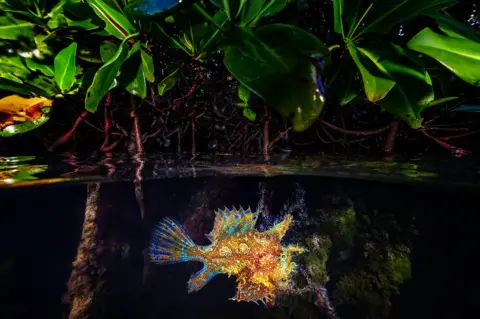 Lorenzo Mittiga
Lorenzo MittigaA rare encounter with a sargassum frogfish out of its natural habitat.
The frogfish is normally associated with sargassum seaweed, floating and travelling on the algae for thousands of miles from the Atlantic Ocean.

Mangroves & Underwater highly commended: Upside-down Jellyfish in the Mangrove, by Lorenzo Mittiga, Netherlands Antilles
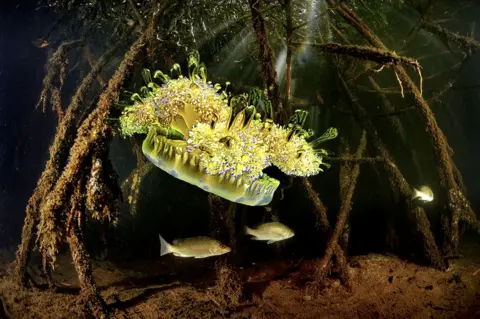 Lorenzo Mittiga
Lorenzo MittigaMangrove habitats are crucial for many different sea creatures, including the fascinating and colourful upside-down jellyfish.

Mangroves & Threats winner: Garbage on Mangroves, by Mark Kevin Badayos, Philippines
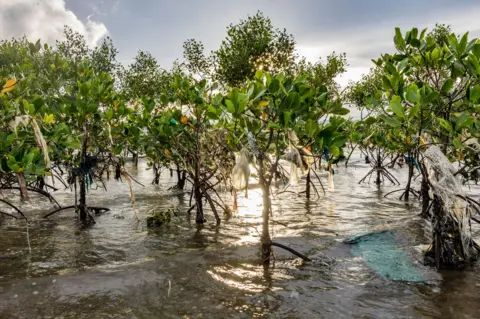 Mark Kevin Badayos
Mark Kevin BadayosThe plastic problem in this part of the world is huge, and the mangroves are threatened, and slowly suffocating in plastic waste.

Mangroves & Threats runner-up: Broken Mangrove, by Dhany Darmansyah Saragih, Indonesia
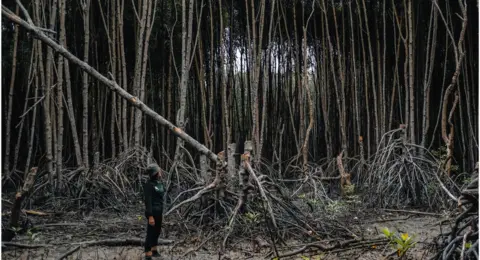 Dhany Darmansyah Saragih
Dhany Darmansyah SaragihLocal people cut down mangrove trees for fuel and building materials for boats and houses.
Over the past three decades, Indonesia has lost 40% of its mangroves.

Mangroves & Threats highly commended: The Reflected Threat, by Marcelo Costa Soares, Brazil
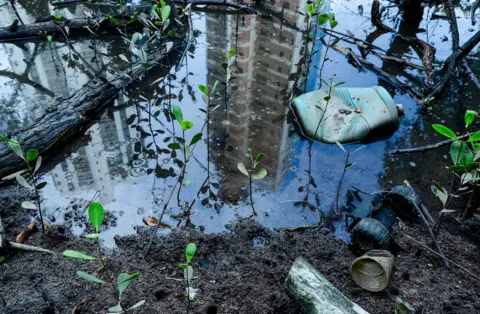 Marcelo Soares
Marcelo SoaresThe image in the photo shows the reflection of the biggest threat to Brazil's largest urban mangrove swamp: real estate speculation in areas of environmental preservation.

Mangroves & Youth winner: Coastal Phantom, by Caleb Hoover, USA
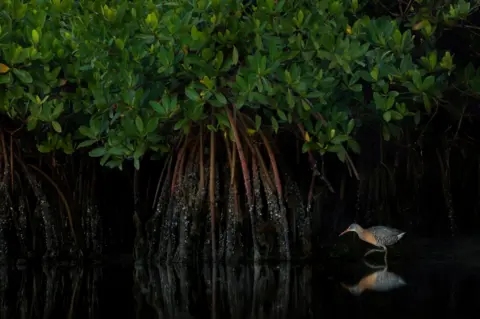 Caleb Hoover
Caleb HooverA clapper rail darts for cover in a patch of coastal red mangroves.
The elusive bird has not been sighted in the area in over six years, but this one has found safety and solitude in a small stretch of mangroves on the coast of Florida.

Mangroves & Youth runner-up: What's Popping? by Lucas Oh Hao Xiang, Singapore
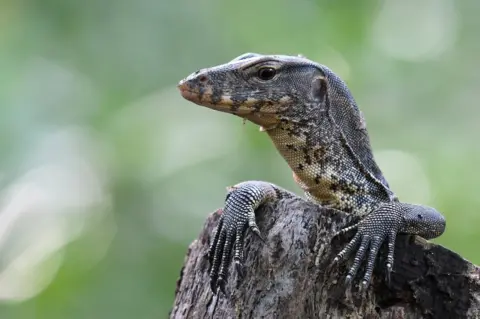 Lucas Oh Hao Xiang
Lucas Oh Hao XiangMangroves are essential for reptiles, like this Malayan water monitor, to thrive in the limited coastal green spaces of the city.
All pictures are subject to copyright.
